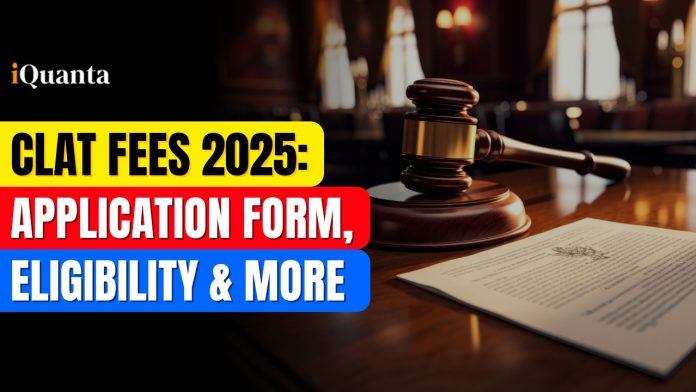The Common Law Admission Test (CLAT) is a pivotal examination for aspiring law students in India. In 2024, approximately 71,243 candidates registered for the exam, vying for about 3,213 CLAT Seats in five-year LLB programs across various National Law Universities (NLUs). As the 2025 exam approaches, understanding the registration process, fees, and eligibility criteria becomes essential for prospective candidates. In This article, we will explore the specifics of the CLAT 2025 registration form, exam fees, and more to help you navigate this crucial phase of your academic journey.
Overview of CLAT 2025
CLAT Exam is a national-level entrance test conducted by the Consortium of National Law Universities (CNLU). It serves as a gateway for admission to undergraduate and postgraduate law programs across India. The exam is set to take place on December 1, 2024, with online registrations opening on July 15, 2024, and closing on October 22, 2024.
CLAT 2025 Registration Process
Understanding the registration process is vital for ensuring a smooth application experience.
Key dates for registration:
Here are the important dates related to the CLAT 2025 registration process:
| Event | Date |
|---|---|
| Registration Starts | July 15, 2024 |
| Registration Last Date | October 22, 2024 |
| Application Correction Last Date | Second week of October, 2024 |
| Release of Admit Card | Third week of November 2024 (Tentative) |
| Exam Date | December 1, 2024 |
CLAT Fee Structure for 2025
Understanding the CLAT exam fees is crucial for candidates planning to apply for the 2025 examination. The fee structure has been designed to accommodate various categories of applicants, ensuring accessibility for all aspiring law students. The application fees for the CLAT 2025 are as follows:
| Category | Application Fee (in INR) |
|---|---|
| General/OBC/PWD/NRI/PIO/OCI candidates | ₹4,000 |
| SC/ST/BPL candidates | ₹3,500 |
| Previous years’ question papers | ₹500 |
The above CLAT exam fees must be paid online during the registration process. It is essential to note that additional bank transaction charges may apply, which will be displayed on the payment gateway page once you select your payment method. Candidates should ensure they have sufficient funds available before initiating the payment process.
Visit NLU Fees Structure to know about the fees of all the NLUs
Important Notes on CLAT Exam Fees
- Non-refundable: The application fee is non-refundable, meaning that only one fee will be refunded if you submit multiple applications.
- Payment Methods: Accepted payment methods include debit cards, credit cards, and net banking. Candidates should choose a method that is convenient and reliable.
- Optional Services: If candidates wish to obtain previous years’ question papers, an additional fee of ₹500 will be charged. This can be a valuable resource for preparation.
Keeping a copy of the payment receipt and confirming that your application status reflects the successful payment of fees is advisable. Regularly check the official website consortium of NLUs for any updates regarding fee structures or changes.
Eligibility Criteria for CLAT Exam 2025
Meeting the CLAT eligibility criteria is fundamental for candidates aspiring to take the CLAT exam. The requirements ensure that all applicants possess the minimum academic proficiency necessary for law studies.
- Educational Qualifications Required
To be eligible for the CLAT 2025 exam, candidates must meet the following educational qualifications:
- For Undergraduate Programmes: Candidates must have completed their Class 12th or equivalent examination from a recognised board with a minimum of 45% marks (40% for SC/ST candidates). Those appearing in their Class 12th examinations in 2025 can also apply.
- For Postgraduate Programmes: A graduate degree in law with at least 50% marks (45% for SC/ST candidates) is required.
- Age Limit and Other Requirements
- No Age Limit: There are no upper age limits to apply for CLAT; it is open to candidates of all ages.
- Nationality: The exam is open to Indian Nationals, NRIs (Non-Resident Indians), PIOs (Persons of Indian Origin), and OCIs (Overseas Citizens of India). However, foreign nationals are not required to take the CLAT exam for admission into Indian law colleges.
Candidates are encouraged to carefully review these eligibility criteria before applying. Ensuring compliance with these requirements will help avoid issues during the application process. For further details and updates regarding eligibility, always refer to the official CNLU website.
Steps to Fill Out the CLAT Application Form
- Visit the official website: Go to the official website of the consortium of NLUs.
- Register: Click on “New Registration” and fill in your contact details.
- Verification: An OTP will be sent to your registered mobile number; enter it to verify.
- Fill Out the Application Form: Provide personal information and educational qualifications.
- Upload Documents: Include a recent photograph and signature in the specified format.
- Pay the Fee: Complete your application by paying the relevant fees online.
- Submit: Review all details before submitting your application.
Required Documents for CLAT Exam Registration
Candidates must prepare the following documents for a successful application:
- Recent passport-sized photograph
- Signature
- Class 10th and Class 12th mark sheets
- Valid ID proof
- Category certificate (if applicable)
Exam Pattern and Syllabus for CLAT 2025
The CLAT exam pattern provides crucial insights into how the examination is structured, allowing candidates to prepare effectively. For 2025, the Consortium of National Law Universities has maintained a consistent format, ensuring that candidates know what to expect.
CLAT Exam Pattern Overview
The CLAT 2025 will be conducted offline (pen-and-paper format) with 120 multiple-choice questions (MCQs) across five sections. Candidates will have two hours to complete the exam. The marking scheme awards 1 mark for each correct answer, while 0.25 marks will be deducted for incorrect responses.
| Particulars | Details |
|---|---|
| Exam Mode | Offline (Pen-and-paper) |
| Duration | 2 hours |
| Total Questions | 120 MCQs |
| Maximum Marks | 120 marks |
| Marking Scheme | +1 for correct, -0.25 for incorrect |
| Language of the Exam | English |
Visit CLAT Exam Pattern, to know about the exam pattern in detail
CLAT Exam Syllabus Breakdown
The syllabus for CLAT 2025 is designed to assess various skills essential for legal studies. It encompasses five key sections:
- English Language: This section includes 24-26 questions focusing on comprehension skills through passage-based questions derived from contemporary literature and non-fiction. Candidates must demonstrate their ability to understand context, infer meanings, and summarise passages.
- Current Affairs Including General Knowledge: Comprising 28-32 questions, this section tests candidates’ awareness of national and international events. Questions may involve analysing passages related to current affairs, requiring no prior legal knowledge.
- Legal Reasoning: With 28-32 questions, this section assesses candidates’ understanding of legal principles through passage-based scenarios. Candidates are expected to apply legal reasoning to factual situations presented in the passages.
- Logical Reasoning: This section consists of 24-26 questions that evaluate candidates’ logical thinking through various arguments and patterns presented in passages.
- Quantitative Techniques: The smallest section, featuring 10-17 questions, focuses on basic mathematical concepts such as ratios, percentages, and data interpretation.
By familiarising themselves with the exam pattern and syllabus, candidates can develop targeted preparation strategies that enhance their chances of success in the CLAT exam.
Important Tips for Candidates
As candidates prepare for the CLAT exam, implementing effective strategies can significantly improve their performance. Here are some essential tips:
- Understand the Exam Format: Familiarity with the exam pattern helps reduce anxiety on test day. Review past papers to understand question types and difficulty levels.
- Time Management: Practice completing mock tests within the allotted time to develop pacing strategies. Allocate time per section based on your strengths and weaknesses.
- Stay Updated on Current Affairs: Regularly read newspapers and reputable online news sources to keep abreast of significant national and international events. This knowledge is crucial for both the Current Affairs section and general awareness.
- Practice Regularly: Consistent practice using sample papers and question papers from previous years will build confidence and improve problem-solving speed.
- Review Basic Mathematics: For the Quantitative Techniques section, ensure you are comfortable with basic arithmetic, algebra, and data interpretation skills.
- Join Study Groups or Coaching Classes: Engaging with peers or enrolling in coaching can provide additional insights and motivation throughout your preparation journey.
Preparation Strategies for CLAT 2025
Effective preparation is key to excelling in the CLAT 2025 exam. Here are some strategies tailored specifically for aspiring candidates:
- Create a Study Schedule: Develop a structured timetable that allocates time for each subject based on your proficiency levels. Consistency is vital; aim for daily study sessions covering all syllabus sections.
- Utilise Quality Study Material: Invest in recommended books specifically designed for CLAT preparation, focusing on each subject area outlined in the syllabus. Resources such as papers from previous years can provide insight into question formats.
- Take Mock Tests: Regularly participate in mock tests under timed conditions to simulate exam day experiences. This practice will help identify areas needing improvement while enhancing time management skills.
- Focus on Weak Areas: After taking mock tests, analyze your performance to identify weak points. Dedicate extra time to these areas while maintaining strengths through regular revision.
- Healthy Lifestyle Choices: Maintain a balanced diet, exercise regularly, and ensure adequate sleep during preparation. A healthy body contributes to a focused mind, which is essential during study sessions and exam day.
- Seek Guidance When Needed: Don’t hesitate to contact teachers or mentors if you encounter difficulties with specific topics or concepts. Their expertise can provide clarity and direction in your studies.
By implementing these tips and strategies, candidates can approach their preparation for CLAT 2025 with confidence and clarity, ultimately enhancing their chances of success in this competitive examination.
Also Read: CLAT Preparation Strategy for all sections
Conclusion
In conclusion, successful preparation for the CLAT exam 2025 hinges on understanding the registration process, fees, and eligibility criteria. With fees structured for various categories, timely payment and compliance are essential. You can enhance your chances of success by employing effective preparation strategies, familiarising yourself with the exam pattern, and staying updated on current affairs. Utilise available resources and refer to the official website for the latest updates as you embark on your journey toward a rewarding legal career.
FAQs About CLAT Exam 2025
The CLAT exam fees for 2025 vary by category. For General/OBC/PWD/PIO/OCI candidates, the application fee is ₹4,000. For SC/ST/BPL candidates, it is ₹3,500. An additional fee of ₹500 applies if candidates wish to obtain previous years’ question papers.
The registration process for CLAT 2025 commenced on July 15, 2024, and will close on October 22, 2024. Candidates must complete their applications within this timeframe to be eligible for the exam.
No, candidates cannot fill out the CLAT exam form in phases. The application must be completed in one go, including all personal details, educational qualifications, and payment of the CLAT registration fees.
To be eligible for CLAT 2025, candidates must have completed their Class 12th with at least 45% marks (40% for SC/ST candidates) for undergraduate programs. For postgraduate programs, a graduate degree in law with a minimum of 50% marks (45% for SC/ST candidates) is required.
The fees for the CLAT exam can be paid online through various methods, including debit cards, credit cards, and net banking. Candidates should ensure they have sufficient funds and confirm their payment status after submission.
If you looking for CLAT Online Coaching along with 24*7 doubt-solving, then you can rely on iQuanta’s CLAT Online Coaching.


